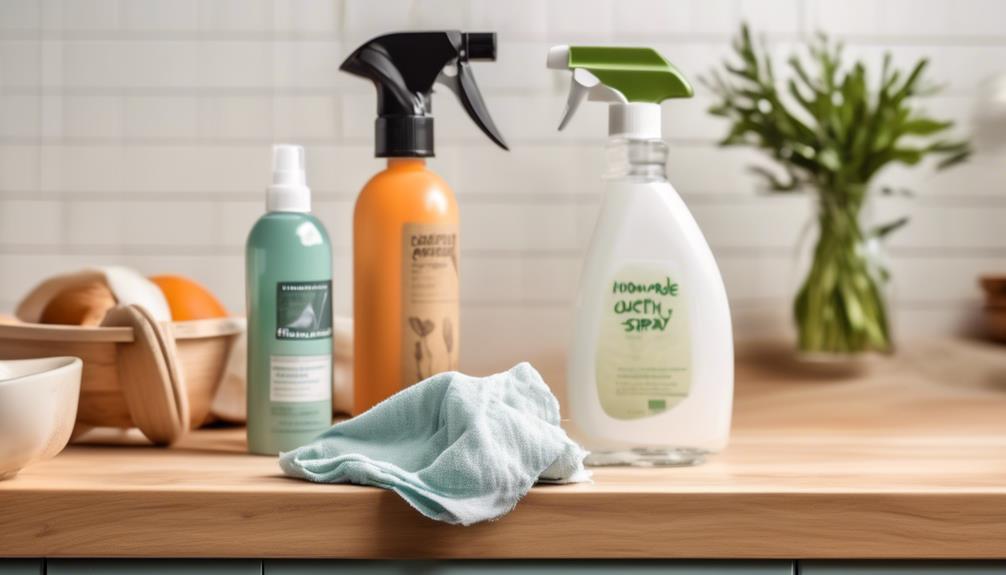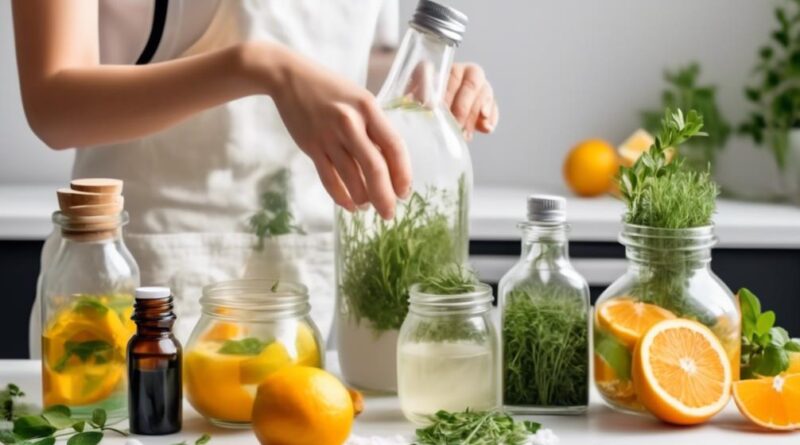Crafting Zero Waste DIY Natural Cleaning Solutions
You want to make your home a healthier and more sustainable place by using natural cleaning solutions. But finding effective zero waste options can be a challenge.
What if you could create your own DIY cleaners using simple, natural ingredients that won't harm the environment?
Imagine having the power to keep your home clean and fresh without contributing to the growing waste problem.
It's possible, and we're here to show you how.
Benefits of DIY Natural Cleaning Products
By using DIY natural cleaning products, you can reduce your exposure to harsh chemicals and contribute to a healthier environment. Not only are these natural solutions safer for your health and the planet, but they also offer cost effectiveness and various health benefits.
When you choose to make your own cleaning products using simple ingredients like vinegar, baking soda, and essential oils, you eliminate the need to purchase multiple expensive commercial cleaners. This cost-effective approach not only saves you money but also reduces the packaging waste associated with buying numerous cleaning products.
In addition to being budget-friendly, DIY natural cleaning products provide significant health benefits. Many commercial cleaning products contain harmful chemicals that can cause respiratory issues, skin irritation, and allergic reactions. By making your own cleaning solutions, you can avoid these health risks and create a safer indoor environment for you and your family.
Furthermore, natural ingredients like vinegar and essential oils have antimicrobial properties, making them effective for killing germs and bacteria without the use of harsh chemicals.
Essential Ingredients for Zero Waste Cleaning
To achieve zero waste cleaning, you can incorporate essential ingredients that are eco-friendly and readily available in your home. By using eco-friendly alternatives and waste reduction strategies, you can create effective natural cleaning solutions without generating unnecessary waste.
One essential ingredient for zero waste cleaning is white vinegar. It's a versatile and effective cleaner that can be used to remove grease, grime, and odors. When combined with water, it can be used to clean windows, countertops, and even sanitize surfaces.
Baking soda is another key ingredient that's gentle yet powerful. It can be used to scrub and deodorize various surfaces in your home.
Additionally, castile soap, which is made from plant-based oils, is an excellent all-purpose cleaner that can be used for dishes, laundry, and general cleaning.
Furthermore, essential oils such as tea tree oil, lavender oil, or lemon oil can be added to your natural cleaning solutions to provide antibacterial and antifungal properties, as well as a pleasant fragrance. These oils not only enhance the cleaning power of your solutions but also offer aromatherapy benefits.
Simple Recipes for Zero Waste Cleaners
As you explore simple recipes for zero waste cleaners, you'll find that incorporating the essential ingredients mentioned earlier can lead to effective and environmentally friendly cleaning solutions.
One simple recipe is DIY vinegar solutions. Vinegar, with its acidic nature, is a powerful natural cleaner. To make a basic all-purpose cleaner, mix equal parts of water and vinegar in a spray bottle. This solution can be used to clean surfaces like countertops, glass, and mirrors. For a refreshing scent, you can infuse the vinegar with citrus peels. Simply place the peels of oranges, lemons, or limes in a jar, cover them with vinegar, and let it sit for a few weeks. Then strain the liquid and use it as a cleaning solution. The citrus peel cleaner not only adds a pleasant aroma but also enhances the cleaning properties of the vinegar.
Another simple recipe for a zero waste cleaner is using citrus peels directly. Instead of throwing away citrus peels, you can utilize them as natural cleaners. Simply rub the peels on surfaces like sinks, faucets, and cutting boards. The natural oils in the peels help to break down grease and grime, leaving the surfaces clean and smelling fresh. This method not only reduces waste but also provides a natural alternative to chemical-laden cleaners.
Tips for Storing Zero Waste Cleaning Solutions
Consider incorporating glass or stainless steel containers for storing your zero waste cleaning solutions to maintain their effectiveness and reduce environmental impact. Container choices play a crucial role in preserving the quality of your homemade cleaners. Glass and stainless steel are non-reactive materials that won't leach harmful chemicals into your solutions, ensuring that they remain safe and potent for longer periods.
When it comes to storing zero waste cleaning solutions, it's important to consider the shelf life of the ingredients used. Natural ingredients such as vinegar, baking soda, and essential oils have varying shelf lives that can impact the overall effectiveness of your cleaning solutions. By choosing appropriate containers, you can help extend the shelf life of your cleaners and reduce the need for frequent remaking or replenishing.
Glass containers, such as mason jars or recycled glass bottles, are excellent choices for storing liquid cleaning solutions. They're impermeable and don't react with the acidic nature of vinegar-based cleaners, helping to preserve their potency.
Additionally, stainless steel containers are durable and can be used for storing powdered cleaning solutions, such as laundry detergents or scrubbing powders, keeping them fresh and effective.
Eco-Friendly Packaging for DIY Cleaners
When packaging your DIY cleaners, prioritize using sustainable materials to minimize environmental impact while maintaining the effectiveness of your solutions. Consider these eco-friendly bottles, jars, and sustainable packaging options:
- Eco-friendly bottles and jars:
- Opt for glass containers: Glass is a durable and reusable option for storing DIY cleaners. It's also non-toxic and doesn't leach harmful chemicals into your cleaning solutions, making it a safe and sustainable choice.
- Reuse old containers: Before purchasing new bottles or jars, consider repurposing empty glass jars or bottles from food items like jam or sauces. Thoroughly clean and sterilize them before transferring your DIY cleaners to reduce waste and promote reusability.
- Sustainable packaging options:
- Biodegradable containers: Look for containers made from biodegradable materials such as bamboo or recycled paper. These options aren't only eco-friendly but also compostable, minimizing the environmental impact even after their use.
- Refillable packaging: Choose refillable options to reduce the need for additional packaging. Many stores offer refill stations for common cleaning solution ingredients like vinegar and baking soda. By refilling your containers, you can minimize waste and reduce the overall environmental footprint of your DIY cleaning products.
Incorporating Aromatherapy Into Cleaning Products
Enhance your cleaning experience by infusing natural scents into your DIY cleaning products using essential oils. Aromatherapy offers a multitude of benefits beyond just making your cleaning solutions smell pleasant. Essential oils have powerful antibacterial, antiviral, and antifungal properties, making them excellent additions to your natural cleaning arsenal. Lemon, tea tree, lavender, and eucalyptus essential oils are particularly effective in killing germs and purifying the air, creating a healthier environment in your home.
When incorporating aromatherapy into your cleaning routine, it's essential to use the right techniques to maximize the benefits of the essential oils. One technique is to add a few drops of essential oil to your homemade cleaning solutions. For example, adding tea tree oil to a vinegar-based cleaner can boost its antibacterial properties. Another technique is to use essential oils in a diffuser while cleaning to not only freshen the air but also uplift your mood and reduce stress.
The benefits of aromatherapy extend beyond just the physical cleaning process. The scents of essential oils can also help to create a calming atmosphere, making cleaning a more enjoyable and therapeutic experience. By incorporating aromatherapy into your cleaning products, you not only create a healthier and safer environment but also elevate the overall cleaning experience in your home.
Zero Waste Cleaning for Specific Surfaces

To continue your eco-friendly cleaning journey, explore zero waste cleaning solutions tailored to specific surfaces in your home, building on the natural cleaning principles discussed earlier.
- Cleaning Marble
For marble surfaces, create a gentle cleaning solution by mixing equal parts water and rubbing alcohol. Apply the solution using a soft cloth to avoid scratching the marble. Wipe the surface clean and dry with a microfiber cloth to restore its natural shine. Avoid using acidic substances like lemon or vinegar, as they can damage the marble's delicate surface.
- Disinfecting Electronics
To safely disinfect your electronic devices, use a microfiber cloth lightly dampened with a mixture of distilled water and isopropyl alcohol. Gently wipe the surfaces of your electronics, such as keyboards, screens, and touchpads. Ensure that the cloth isn't excessively wet to prevent moisture from entering the delicate components. This simple solution effectively removes fingerprints, dust, and bacteria without harming the electronic devices.
Sustainable Practices for Zero Waste Cleaning
Consider incorporating reusable cleaning cloths and brushes into your cleaning routine to minimize waste and environmental impact. When it comes to maintaining a zero waste kitchen, using reusable cleaning cloths and brushes is an effective and sustainable practice.
Instead of disposable wipes or paper towels, opt for washable and durable cloths made from materials like organic cotton or bamboo. These can be easily washed and reused, significantly reducing the amount of waste generated from cleaning activities.
In addition to reusable cleaning tools, using green cleaning products can further enhance your sustainable cleaning practices. Look for eco-friendly cleaning solutions that come in biodegradable or refillable containers. Many companies now offer concentrated formulas that can be diluted with water, reducing the need for excess packaging. These products are often made with natural and non-toxic ingredients, making them safe for both your family and the environment.
Frequently Asked Questions
Can I Use Natural Cleaning Solutions on All Types of Surfaces, Including Delicate Materials Like Marble or Granite?
You can use natural cleaning solutions on most surfaces, but be cautious with delicate materials like marble or granite. These surfaces can be sensitive to acidic ingredients, so choose gentle, pH-neutral cleaners designed specifically for cleaning marble and granite.
Are There Any Potential Risks or Safety Concerns When Using DIY Natural Cleaning Products?
When using DIY natural cleaning products, it's important to be aware of potential risks and safety concerns. Take precautions to ensure that the natural ingredients used are safe for specific surfaces and to minimize environmental impact.
How Can I Effectively Remove Tough Stains or Grime Using Zero Waste Cleaning Solutions?
To effectively remove tough stains or grime, try eco-friendly alternatives like zero waste cleaning solutions. DIY stain removal using natural ingredients, like vinegar and baking soda, can be just as effective without the harmful chemicals.
Can I Use Essential Oils in My Natural Cleaning Products if I Have Pets or Small Children in the House?
Yes, you can use essential oils in your natural cleaning products, but take care with pet and child safety. Some essential oils are not safe for pets or children. Check for effectiveness, surface compatibility, and safety.
Are There Any DIY Natural Cleaning Solutions That Are Specifically Effective for Eliminating Mold or Mildew?
To prevent mold, eco friendly solutions like vinegar, hydrogen peroxide, and tea tree oil are effective. Mix equal parts vinegar and water in a spray bottle, and add a few drops of tea tree oil for a natural mold prevention spray.
Conclusion
Now that you have the knowledge and tools to create zero waste DIY natural cleaning solutions, you can make a positive impact on the environment and your health.
By using simple ingredients and eco-friendly packaging, you can reduce waste and harmful chemicals in your home.
With these tips and recipes, you can easily transition to a more sustainable and healthy cleaning routine.
Start crafting your zero waste cleaners today and enjoy a cleaner, greener home.
